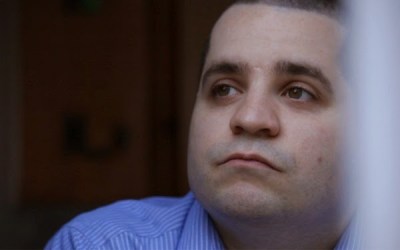Thought Crimes (2015) will be remembered over the next few years for sparking grand scale debate on where one’s right to freedom and privacy ends online, and where the need for law enforcement intervention and criminal prosecution begins. Directed by Erin Lee Carr, the documentary does an outstanding job of remaining as objective with the case as possible. The story follows ex-NYPD officer Gilberto Valle, more commonly known to the general public as New York City’s, ‘Cannibal Cop’. Valle, a seemingly conventional lifetime resident of the Queens borough, had his entire life changed when his wife discovered thousands of text based conversations between him and various strangers.
The group covered an array of hardcore, underground fetish websites, vividly detailing his desire to kidnap, brutally rape, torture, and consume the flesh of multiple women. Carr brilliantly shies away from the case, instead focusing on the question surrounding the legitimacy of Valle’s main charge; conspiracy to kidnap. Using a handful of carefully selected psychiatric professionals, criminal lawyers, and activists, Carr is able to present a persuasive argument that Valle has not only been demonised for his thoughts, but has faced immoral and illegal persecution for creating fantasy based erotica. While Carr’s personal position is clear, she never lets her bias cloud her storytelling, allowing other lawyers and health care workers to contrast the opinions with an equal amount of allotted time and attention.
Thought Crimes couldn’t have come at a better time, either. Coverage of illegal information and hardware seizures in conjunction with the heightened focus on the NSA following Edward Snowden‘s controversial whistleblowing operation has created an almost paranoid frenzy around any conversation involving the terms ‘law enforcement’ and ‘privacy’ on the internet. Carr manages to succeed where others have failed, focusing on a typical, red-blooded American that many could see as themselves instead of centering the story on the clichéd genius teenage hacker or the dreadlocked activist that has become a worldwide caricature thanks to ratings-starved nightly news programs. Even while reading the vile comments Valle would write about his succubus fantasies, it is difficult to entirely hate the awkward, genuine man portrayed.
Unfortunately, there are a few flaws with Carr’s feature. The pacing of the entire film seems a little off-kilter and Carr often jumps from one subsection of the case to the next and back again without much explanation for her reasoning. The use of Valle cooking food as a way to remind audiences he was once aroused by the idea of cooking women and eating them is comical the first two times, but quickly becomes both redundant and tasteless. Most daunting is the lack of input from Valle about his civil rights. His tirade of endless defense speeches come across as scripted and, even with full access to him and his mother, she fails to get him to touch upon his own fantasies. At the end of any good documentary, a specific subject matter is highlighted and an in-depth knowledge of it is provided. At the end of a great documentary, a conversation is not only started, but continues far after the credits roll. On these criteria alone, Thought Crimes is an outstanding feature.
Julia Alexander | @loudmouthjulia



